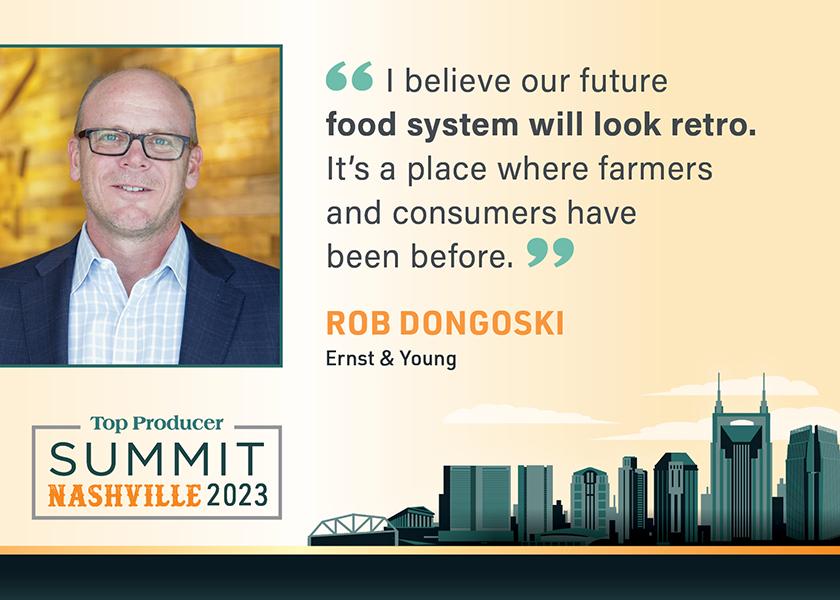3 Tenets Of A Decade-Forward View of the U.S. Food System

The U.S. food system is being reimagined today and farmers can benefit from thinking about how to improve their ability – and agility – to take advantage of opportunities in the process, according to Rob Dongoski.
“We’re taking a decade-forward view of the entire food system, and most of the folks in this room are key players,” he told farmers attending the 2023 Top Producer Summit on Tuesday in Nashville.
He says the food system will increasingly be based around three tenets according to Dongoski, founder of the Ernst & Young Global Agribusiness Center. The three tenets are:
1. The food system is in the process of moving from being a commodity-driven supply chain focused on scale to a more personal, consumer-centric system.
Dongoski says the transition was already underway when it got a big boost from the Covid pandemic. He anticipates the transformation underway will continue for the next five to 10 years.
“Consumers are getting really loud about what they want,” he says. “’I’m not sure about all those processed foods. I like to know what's in my food’
are just two of the messages they’re giving us.”
Dongoski says consumers are also increasingly listening and buying into what product marketers are telling them rather than scientists. Science doesn’t hold as much sway. “Marketers are winning the communication battle because they are better funded,” he says.
Part of what’s at play in the marketplace are significant changes in consumer demographics.
Dongoski says the most populous generations in the workforce today aren’t Gen Xers and Baby Boomers. Instead, the Millennials and Gen Z generations have increasing influence, and they think about food in very different ways from their predecessors.
“While Boomers and Gen Xers think about cars and houses as status symbols, Gen Z and Millennials think, ‘I grocery shop at Whole Foods. I don't go to the fast, casual dinner outlets. I cook at home. I go to the farmers market.’ Their experience with food is very, very different,” he says.
Despite the myriad changes underway, some things remain from the past regarding how consumers evaluate their food purchases. “They have always and will always consider two key criteria – affordability and taste,” Dongoski says.
2. The second tenet is food will need to be increasingly planet friendly.
Dongoski says he always enjoys hearing from people when they come back from global environmental events such as the Davos Conference and COP27 and tell him to think about “all the damage your industry does.”
His response to them: “I think you mischaracterize most of the people that do the hard work on the land. I've never met a farmer or anybody that owns land who is thinking, ‘Man, what I really (want) to do is destroy it.’”
Still, he does believe farmers have opportunities to be more conscious of practices that are planet friendly.
“There are many opportunities to take care of livestock differently,” he contends. “The pendulum can shift to extremes, but I do think we can be smarter. When I see things in the grocery store like plastic-wrapped bananas, that just seems kind of silly to me,” he adds.
3. The third tenet of the future: food will be based around a more connected system.
“When I think about the future of food, I believe the food system will look retro,” he says. “The future is a place farmers and consumers have been before.”
Decades ago, he says consumers had a butcher and a baker on the corner, and milk was delivered to their home. “We had home delivery decades ago, folks. It’s not new,” he says. “We're going back to that scenario where consumers know their food producers.”
A key difference, he says, is the future system won’t be geographically based. Rather, the personal connections between consumers and producers will be based on data.
Today, consumers get glimpses of farmers and their production practices when they walk down grocery store aisles and eat in restaurants. Stores and restaurants often feature names, photographs and information on the individuals and families who produced the food the consumer plans to purchase.
“That’s how consumers will have insights into your operations and practices that you’re willing to expose and be proud of, that will influence a consumer,” he says.
Watch the 2023 Top Producer Awards Banquet
See 8 Farmer-First Startups at Top Producer Summit
3 Consumer Trends Farmers Can’t Afford to Ignore







